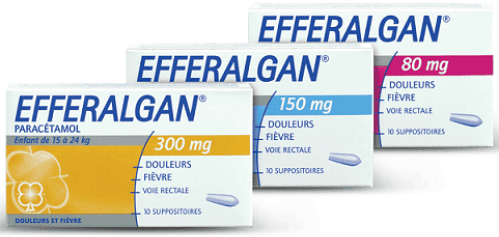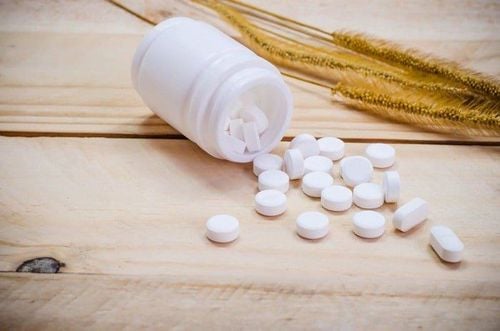This is an automatically translated article.
Offipain medicine contains the main ingredient is Paracetamol which is administered by intravenous infusion. It is a pain reliever and fever reducer, usually indicated for short-term treatment of pain and fever.
1. What is Offipain?
Offpain medicine has the main ingredient is Paraceatmol, prepared in the form of a solution for infusion of 100ml, each ml of solution contains Paracetamol 10mg.
Paracetamol in the composition has the effect of reducing pain, reducing fever quickly. The analgesic mechanism of paracetamol has not been fully studied at present, this effect can be attributed to the fact that Paracetamol inhibits the synthesis of Prostaglandin, thereby blocking the transmission of pain impulses in the central nervous system and the central nervous system. Peripheral. Paracetamol acts on the thermoregulatory center in the hypothalamus, thereby helping to dilate peripheral vessels, increasing blood circulation, increasing sweating and lowering body temperature.
2. Indications and contraindications of Offipain
Offipain infusion solution 10mg/ml is used for short-term treatment of the following cases:
Treatment of moderate pain, especially postoperative pain. Administer intravenous medications when rapid pain and fever relief is required or when the patient cannot take other medications. Do not use Offipain 10mg/ml in the following cases:
Hypersensitivity to Paracetamol or to any component of the drug. Patients with severe liver failure.
3. Usage and dosage of Offipain
Administer Offipain by intravenous infusion over 30 minutes. Use this medicine only with medical help.
Dosage of the drug is as follows:
For adolescents and adults weighing over 50kg: Use 1g/time, not more than 4g daily. Children over 33kg (over 11 years old), adults under 50kg: Use by weight 15 mg/kg equivalent to 1.5ml/kg, use not more than 60 mg/kg/day (equivalent to about 3g/day) maximum 4 times/day. Children weighing over 10kg and under 33kg (1-11 years old): Infusion at a dose of 15 mg/kg equivalent to 1.5 ml/kg. Use up to 60 mg/kg/day (2g/day). Children under 1 year old (weighing less than 10kg): Use a dose of 7.5 mg/kg, equivalent to 0.75 ml/kg, up to 4 times/day. Minimum interval between 2 doses is 4 hours, maximum 4 times/day.
Patients with severe renal impairment (creatinine clearance less than 30ml/min): The interval between doses should be at least 6 hours. Malnutrition, liver failure, alcoholism, patients with dehydration: Use up to 3g/day. Overdose can cause liver damage, causing cholestatic hepatitis, cytolytic hepatitis, liver failure, fulminant hepatitis more common in the elderly, young children, malnourished subjects, functional liver function decline. Overdose signs usually appear within the first 24 hours such as nausea and vomiting, loss of appetite, abdominal pain, and pallor. Doses equivalent to doses > 7.5 g in adults or > 140 mg/kg in children can cause irreversible hepatitis, complete liver necrosis, and lead to liver failure, hepatic encephalopathy, and death. .
In case of overdose, it is necessary to check the concentration of Paracetamol as soon as possible. Treat promptly with the antidote N-Acetylcysteine or an alternative if N-Acetylcysteine is not available.
4. Undesirable effects of the drug Offipain
Side effects when using Offipain are rare or very rare, including:
Rare: Feeling uncomfortable, nausea, increased liver enzymes, low blood pressure. Very rare: Thrombocytopenia, leukopenia, neutropenia, pancytopenia, anemia; allergic reaction; Renal disease and nephrotoxicity are common with prolonged use. When taking the drug, if you have any unusual symptoms, you should immediately tell the medical staff so that they can be treated if necessary.
5. Note when using Offipain
This drug should only be used short-term, if possible should be changed to oral form or stopped when not needed. Use caution when administering this drug to patients with pre-existing anemia, as this may mask the symptoms of side effects. Use with caution in patients with impaired liver function, alcoholics, dehydration, malnutrition, severe renal impairment (clearance less than 30ml/min). Do not use alcohol when taking medicines or preparations containing paracetamol. Pregnancy: There are currently no adequate reports of the use of parenteral Paracetamol in pregnant women. Studies with oral administration have shown no adverse effects in pregnant women or the fetus. But you should not abuse it and should be careful when using it for these objects. This drug may be excreted in breast milk. There are no reports of contraindications during lactation. Consult your doctor before use if you are breast-feeding.
6. Drug interactions
Drug interactions when used in combination with other drugs studied include:
Salicylamide: Prolongs the half-life of the drug. Probenecid: Approximately 2 times the clearance of Paracetamol. Administration of Paracetamol approximately 4 g/day for more than 4 days with oral anticoagulants may cause a slight change in the INR. To be on the safe side, tell your doctor right away about the medications and health foods you're taking to be considered for possible interactions.
Hopefully, with the above information about the drug, you know what Offipain drug works and how to use it. This drug should be used under the supervision of medical staff, patients should not self-administer.
Please dial HOTLINE for more information or register for an appointment HERE. Download MyVinmec app to make appointments faster and to manage your bookings easily.













